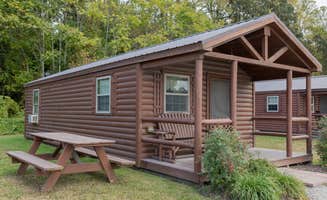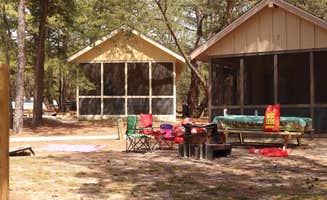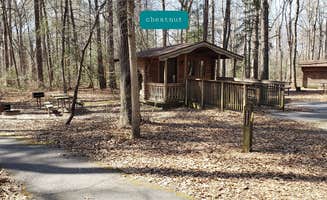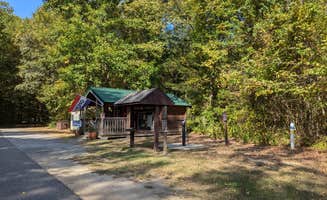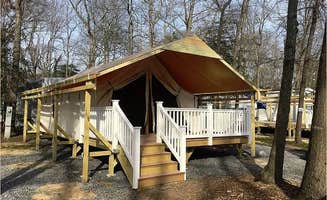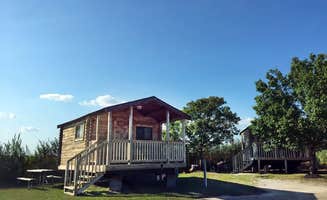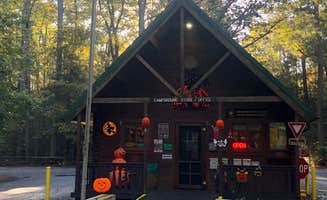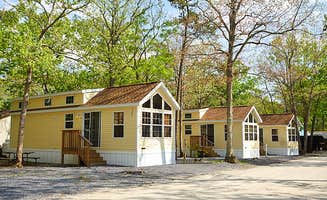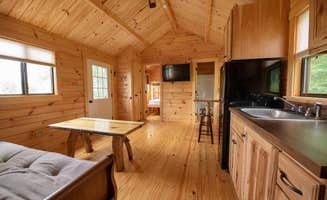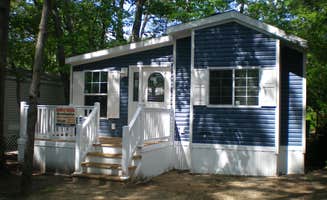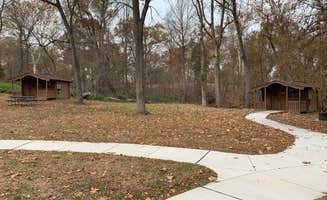Camping cabins near Milford, Delaware are situated in the mid-Atlantic coastal plain where sandy soil and flat terrain characterize the landscape. The area has a humid subtropical climate with mild winters averaging 40°F and humid summers reaching 85-90°F. Most state parks in the region feature maritime forests of loblolly pine and hardwoods, with camping areas typically located within a 30-minute drive of the Delaware Bay or Atlantic Ocean beaches.
What to do
Water activities at Trap Pond: This park features the northernmost natural stand of bald cypress trees in the United States, creating unique kayaking opportunities. "We walked around the pond and rented boats and kayaks for the day and rowed back to our site which the kids loved. They got to spend the day learning to paddle on the pond," notes one visitor who enjoyed the island camping site at Trap Pond State Park Campground.
Biking opportunities: Many parks offer free bicycle rentals and dedicated trails. At Trap Pond, "Bike rentals are free (donations accepted), there are several hiking/biking/horse trails, disc golf, and canoe/kayak/peddle boat rentals (in season)." Cape Henlopen provides extensive paved paths: "The trails are awesome and easy to walk or ride bikes on, with a few hills to muscle up, but it's mostly flat terrain and paved. There's a nature center nearby that also lets you borrow a bike for free if you didn't bring your own."
Wildlife viewing: The region's wetlands and forests support diverse wildlife observation opportunities. "The woods are full of nature and diverse species. We counted over 17 different species of fungi in a 25 foot stretch!" shared a visitor at Killens Pond State Park Campground, which offers nature walks and educational programs year-round.
What campers like
Historical features: Many parks have preserved military structures and historical sites. "The historic aspect of the Cape amazed me. It was a site for WWII soldiers to watch for enemy invaders. The towers are still there," mentioned one camper at Cape Henlopen State Park Campground, where underground bunkers and observation towers provide educational opportunities.
Nature centers: Educational facilities enhance the cabin camping experience with interactive exhibits. "The nature center has a few herps in cages to view and an interactive touch screen. The lower level has a small room that has coloring pages and a video for kids," noted a Trap Pond visitor, highlighting the family-friendly amenities beyond just cabin lodging.
Off-season visits: Many campers prefer shoulder seasons for a quieter experience. "We visited off season (early April) and absolutely loved it. The location was great and the beaches are quiet. I hear it gets packed and I see that it's hard to book if you don't book early," reported a Cape Henlopen camper, indicating the benefit of planning ahead for prime cabin reservations.
What you should know
Proximity to beaches: Cabin accommodations provide access to both bay and ocean beaches. At Delaware Seashore State Park Campground, "There is direct access to the beach under the bridge where there are restaurants, concessions, and other activities at the Big Chill Beach Club. There is also a pedestrian walkway on the bridge which was kind of cool."
Seasonal variations: Weather conditions affect camping experiences significantly. "It was about a mile walk to the beach. There are multiple parking lots if you want to drive a bit closer to a beach entrance. We have two young kids and it was a bit too long a walk for them from the camp site. Bikes are prevalent and a great way to get around. We were there in July and it was very hot which is obviously to be expected."
Booking requirements: Advance planning is essential, especially for cabins. "Sites were level and paved along with some sand and grass. Also a picnic table—no fire rings at the sites, but there were a couple campfire areas scattered around the park. We spent most of our time at the beach anyway so the small site really didn't matter much."
Tips for camping with families
Water parks and pools: Some campgrounds offer water recreation beyond natural bodies of water. "My kids had a blast in the water area with the pool and large slides," shared a visitor at Yogi Bear's Jellystone Park At Delaware Beaches, located about 20 minutes from Milford. "Splash pad was nice, I enjoyed that more so than the pool."
Educational playgrounds: Many parks feature interactive play areas with educational components. "If you have kiddos, try and get a site in Loop A – there is a nice and educational play area (plus a game I'd never heard of– Gaga ball). There is an additional playground in the day-use area, plus a volleyball net."
Activity planning: Organized campground events keep children engaged. At Jellystone Park, a visitor noted, "There are a TON of mostly free activities for kids, which is awesome." Another camper mentioned, "Staff did excellent job with alternate activities due to weather during our stay. Clean campground, clean bath house, no lifeguard at pool though."
Tips from RVers
Site selection strategy: Choose sites based on proximity to amenities and privacy needs. At G & R Campground, "There are a lot of nice spots, and a good mix of the monthly/seasonal folks and us weekenders. There is a smell due to being next to a chicken or animal farm; however, after a few minutes outside, the smell goes away."
Hookup considerations: Water and electric access varies between parks. "Sites have 30A electric and water with a nearby convenient dump station," noted a Trap Pond visitor, while another mentioned, "They are not level and have a sandy base so it took a bit of work to finally get the rig level, even with auto-levelers."
Space limitations: Site dimensions can restrict larger rigs. Cape Henlopen campers observe, "If you're going to camp at one of the RV sites, you'd better have an RV. They are neither RTT nor tent friendly. The sites are packed in so closely that if you don't have the privacy of a camper, everyone will see your business."


